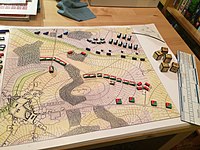Monster game
Appearance
| Part of a series on |
| Wargames |
|---|
 |
A monster game is a game that is either very large, very complex, or both.[1] One criterion sometimes adopted is the number of pieces; a game which puts greater than 1000 counters into play at once may be considered to be a monster game.[2] This classification can technically be applied to any board game, but most commonly refers to the kind of non-abstract wargames in which a large amount of time is needed to play each turn as a result of a relatively high commitment to period accurate military realism. Drang Nach Osten and its companion, Unentschieden led to the Europa Series games, a giant WWII game.[3]
Wargames that are considered monster games include:
| Wargame | Company | Year | Counters | Playing time (hours) | Description |
|---|---|---|---|---|---|
| Drang nach Osten! (DNO) | GDW | 1973 | 1,792 | 200 | A game to cover Operation Barbarossa, the German invasion of Russia.[4] |
| Europa series | GDW, GRD, Mill Creek Ventures and Historical Military Services (HMS) | 1973- | A series containing 17 war games (the first being Drang nach Osten!), which can be combined, most games classified as monster games. | ||
| La Bataille de la Moscowa | GDW | 1975 | 1,440 | 16 | A simulation game of the Battle of Borodino. It is both complex and large.[1] |
| War in Europe | SPI | 1976 | 3,600 | 6 | A simulation game of the war in Europe. This game is a combination of War in the East and War in the West with additional rules and mechanics.[5] |
| Highway to the Reich | SPI | 1976 | 2,400 | 6 | The game is set during the Second World War, covering ten days of Operation Market-Garden, from 17 to 26 September 1944, with two hours per turn. |
| War in the Pacific | SPI | 1978 | 3,200 | 6 | A simulation game of the War in the Pacific with 7 maps.[6] |
| The Campaign for North Africa | SPI | 1979 | 1,600 | 1,000 | A game about the North African campaign of World War II |
| The Great War in Europe | XTR Corp | 1995 | 1,200 | 6 | A simulation game of the first world war in Europe. |
| DAK | The Gamers | 1997 | 1,540 | 6 | A game that covers the entire North African campaign at the regimental level |
| War Between the States 1861–1865 | SPI | 1977 (1st edition) 2004 (2nd edition) | 1,400 | A game that covers the entire American Civil War, the major theaters of operation from Galveston, Texas, to St. Joseph, Missouri, and from Philadelphia, Pennsylvania, to Jacksonville, Florida. | |
| Case Blue | The Gamers | 2007 | 3,500 (2,660 unit counters and 840 marker counters) | 375 | A game that covers both the Axis advance (between 1941 and 1942) as well as the Soviet counterattacks (Nov 42 to Jan 43) and the German counteroffensive at Kharkov (Feb-March 1943) including the Case Blue 1942 strategic summer offensive in southern Russia between 28 June and 24 November 1942, during World War II.[7] |
See also
[edit]- Europa (wargame)
- War in Europe (game)
- List of board wargames
- List of wargame publishers
- Simulation game
- Tactical wargame
References
[edit]- ^ a b Palmer, Nicholas (1980). "Chapter 3 - The First Thousand Hours are the Hardest: Monster Games". The Best of Board Wargaming. New York, N. Y.: Hippocrene Books. ISBN 0-88254-525-6.
- ^ Palmer, Nicholas (1980). The Comprehensive Guide to Board Wargaming. London: Sphere Books.
- ^ the Staff of Strategy & Tactics Magazine (1977). Wargame Design: The History, Production and Use of Conflict Simulation Games. New York: Simulations Pubublications, Incorporated. ISBN 0-917852-01-X.
- ^ Freeman J, The Editors of Consumer Guide (1980). The Complete Book of Wargames. New York: Simon and Schuster. ISBN 0-671-25374-3..
- ^ Dunnigan, James (1992). The Complete Wargames Handbook. New York: Quill. ISBN 0-688-10368-5..
- ^ Perla, Pewter P. (1990). The Art of Wargaming. Annapolis, Maryland: Naval Institute Press. ISBN 0-87021-050-5..
- ^ "Case Blue (2007)". Boardgamegeek. Retrieved 2017-12-28.
External links
[edit]- Drang Nach Osten! (Boardgamegeek)
- SPI Monster Games
